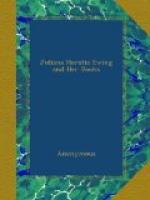In 1874 Julie wrote “A Great Emergency” as a serial for the Magazine, and took great pains to corroborate the accuracy of her descriptions of barge life for it.[24] I remember our inspecting a barge on the canal at Aldershot, with a friend who understood all its details, and we arranged to go on an expedition in it to gain further experience, but were somehow prevented. The allusions to Dartmouth arose from our visit there, of which I have already spoken, and which took place whilst she was writing the tale; and her knowledge of the intricacies of the Great Eastern Railway between Fenchurch Street Station and North Woolwich came from the experience she gained when we went on expeditions to Victoria Docks, where one of our brothers was doing parochial work under Canon Boyd.
[Footnote 24: Letter, July 22, 1874.]
During 1874 five of her “Verses for Children” came out in the Magazine, two of which, “Our Garden,” and “Three Little Nest-Birds,” were written to fit old German woodcuts. The others were “The Dolls’ Wash,” “The Blue Bells on the Lea,” and “The Doll’s Lullaby.” She wrote an article on “May-Day, Old Style and New Style,” in 1874, and also contributed fifty-two brief “Tales of the Khoja,"[25] which she adapted from the Turkish by the aid of a literal translation of them given in Barker’s Reading-Book of the Turkish Language, and by the help of Major Ewing, who possessed some knowledge of the Turkish language and customs, and assisted her in polishing the stories. They are thoroughly Eastern in character, and full of dry wit.
[Footnote 25: “Miscellanea,” vol. xvii.]
I must here digress to speak of some other work that my sister did during the time she lived in Aldershot. Both she and Major Ewing took great interest in the amateur concerts and private musical performances that took place in the camp, and the V.C. in “The Story of a Short Life,” with a fine tenor voice, and a “fastidious choice in the words of the songs he sang,” is a shadow of these past days. The want that many composers felt of good words for setting to music, led Julie to try to write some, and eventually, in 1874, a book of “Songs for Music, by Four Friends,"[26] was published; the contents were written by my sister and two of her brothers, and the Rev. G.J. Chester. This book became a standing joke amongst them, because one of the reviewers said it contained “songs by four writers, one of whom was a poet,” and he did not specify the one by name.
[Footnote 26: H. King and Co.]
During 1875 Julie was again aided by her husband in the work that she did for Aunt Judy’s Magazine. “Cousin Peregrine’s three Wonder Stories “—1. “The Chinese Jugglers and the Englishman’s Hand”; 2. “The Waves of the Great South Sea”; and 3. “Jack of Pera"[27]—were a combination of his facts and her wording. She added only one more to her Old-fashioned Fairy Tales, “Good Luck is Better than Gold,” but it is one of her most finished bits of art, and she placed it first, when the tales came out in a volume.




